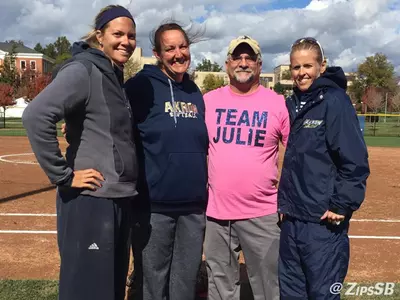The University of Akron Athletics

Zips Wear Green for Scalf and Brain Injury Awareness
March 22 | Softball
AKRON, Ohio – So many people associate the color green and the month of March with St. Patrick's Day and college basketball's March Madness, but to others those two things symbolize much more.
What most people don't know is that the month of March is also brain injury awareness month, and the color for brain injury awareness is green. This campaign often gets outshined but deserves as much attention and awareness as any other traumatic injury or disease.
On Tuesday, March 22, the University of Akron softball team will be donning the color green for a beloved member of the Akron coaching staff.
Seven years ago, Akron's volunteer assistant coach Scott Scalf suffered a brain hemorrhage caused by an arteriolvenous malformation in his brain that ruptured and caused massive bleeding. Coach Scalf was unable to speak or walk, and lost all control of his body.
After being in a hospital for over a year, coach Scalf said that he was forced to adjust to a new normal life.
"You don't ever fully recover from a brain injury. I had to relearn how to walk, read and function in everyday life," said Scalf.
This injury affected every aspect of Scalf's life in many ways.
"Physically the effects are 'left neglect' meaning I no longer have peripheral vision on my left side and my brain often does not recognize things on my left side," said Scalf. "It takes me longer to accomplish tasks that others find easy, I become mentally fatigued, and I have many memory issues."
Scalf was forced to change how he lived his daily life, as he is no longer able to work.
"Following a brain injury the most important thing is to have a life," said Scalf
So he had to find a way to live his life, and he did just that.
Before the injury, Scalf was a softball coach at Archbishop Hoban High School in Akron, Ohio. Scalf loves the game of baseball and softball and because of his love of the game, he found a way to survive such a traumatic experience.
Scalf is now in his fourth year working with the Akron softball team.
"Following my injury coach Jones and coach Pratt invited me to observe the team in an effort to re-learn the coaching skills that I had before my injury. I was forced into medical retirement but I knew that I needed to continue working with youth and coaching," said Scalf. "I attended practice and games every day for about a year. Coach Jones asked me to join her staff as a volunteer coach. I quickly accepted."
As part of his volunteer duties, Scalf helps with the equipment, charting, as well as statistical information and working with scouting reports. Additionally during all home events, he provides color commentary for the Zips live web streams.
"It has been life saving. Every day that I get to come to the university and spend time with this team I am grateful and realize how very blessed I am," said Scalf. "My faith and the opportunity to serve the team that the coaching staff has given me has helped me and my family survive."
With the support he has received from his family and the Akron softball team, Scalf is able to live his life with purpose.
"I am not really sure where I would be. The coaching staff and the team have given me a reason to get up in the morning and leave the house. Without that I am not sure where I would be," said Scalf.
The Akron softball team is his "thing", it's his way of helping deal with the hardships and complications that his brain injury has caused him. Scalf believes that finding that "thing" in life is extremely important.
"You must have a purpose in life. When everything is changed in your life, you need to have a reason to get out of bed," said Scalf. "I often spend time counseling others and I tell them all that they need to find a purpose. Find a group to be part of. Without that, all the medicine in the world may not help."
A brain injury is an invisible thing. When someone is affected by it you can't see the physical issues that someone has to deal with.
"There is a lot of talk in the news about brain injury in sports and battle. As a veteran and being involved in sports I find it very important that people understand that brain injury affects all of us in some way," said Scalf. "It affects not only those that have suffered the injury but also their family and friends. The family needs as much if not more support than the patient."
The Zips have joined the campaign to help raise awareness for traumatic brain injuries in hope to help educate the public about incidence of brain injury and the needs of people with brain injuries and their families.














